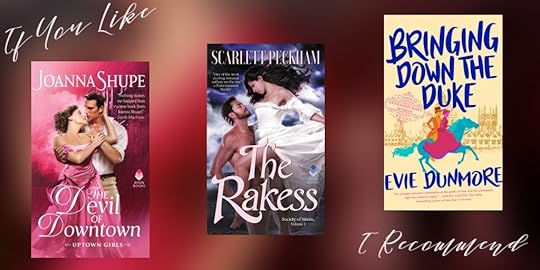What do you think?
Rate this book


394 pages, Mass Market Paperback
First published August 24, 2021


She shook her head. “You magnificent man. Full of protective instincts and a need to sacrifice your happiness. Truly, someone should put you in a novel.”1. I enjoyed Caleb and Sesily for the most part. Caleb was sexy and broody and this picked up where they left off in Sera's book so the pining and angst felt real and believable. I honestly was expecting the romance and the hero to be completely drowned out with the laborious writing and Hell's Belles plot. I didn't notice the overwrought repetitive writing until the 80% mark which for a SM book feels like a Herculean effort. But even so, this had problems which kept taking me out of the story. The last 20% especially was really hard to get through and had me wishing they would just get on with the HEA.

The Duchess of Trevescan, with money and power to spare. Adelaide Frampton, whom the entire world seemed to think was a simpering wallflower but was able to wield a blade without trouble. Imogen Loveless, who’d knocked a bruiser out with a concoction Caleb never wanted to be on the receiving end of. Maggie, who had eyes everywhere. The others. And Sesily, like a fucking goddess, up on the bar, red skirts gleaming in the lanternlight, smile on her face and quip on her tongue as she cracked a Bully Boy over the head with a table leg like she was playing shuttlecock.
It was a crew if he’d ever seen one.
A revolution, clad in rouge and silk.

“You really aren’t playing the doting older brother role well, Sera,” he replied. “You ought to remember that generally they don’t insult the honor of their sisters quite so readily.”Yes because women in 1838 London were equipped with all ways of protecting their own honor much less having siblings and best friends obsessing over their "swiving" skills like it's their business to air out. In what world or era is this even considered normal or decent? It's scenes like this that just made you want to roll your eyes instead of fist pump. But I digress. If you’ve read Tessa Dare or Maya Roydale then you are familiar with anachronistic writing. And most of which isn't intentional. Here, it feels very deliberate. Taking modern topical subjects and punching it into a historical setting. And that's fine, but I prefer more finesse. Yes it's fiction. Yes authors have creative license to tweak things and be creative with themes but when you feel like you are being yelled at from soap box on every few pages from every. single. character. then that's when it's no longer realistic and more of a distraction. People can debate this to their heart's content but you will never convince me this is even remotely realistic for a historical:
“And again! So droll!” Seraphina said before adding, matter-of-factly, “I’m not playing some archaic role; Sesily can take care of her own honor.”
It was Caleb’s turn to be surprised.
“She’s a grown woman and more than capable of taking a lover safely.”
And every woman in attendance knew that this party was to be kept secret. The duchess ensured it, by making sure every woman in attendance had access to more than the party. Every guest had access to freedom. On these evenings, just inside the rear entrance to Trevescan House, accessible to all who passed, was an ancient, chipped soup tureen, dug out from the dark corners of the Trevescan kitchen and filled with money. There were no rules for borrowing from the tureen—there were no limits to the amount that could be taken, nor was it required that funds be returned. Instead, the money was available to any guest who needed it. To escape a horrid employer, to help a friend in need, to find passage out of London. No questions asked. Once, Sesily had praised the duchess’s cleverness in adding payment of sorts to the women who attended her soirees, and the other woman had corrected her instantly. The money was to help, not to barter. It was not for quid pro quo, but to ease the ever-present worry that so many women had when money was not available and they were in over their heads. The duchess knew the truth: money was power.So a rich married Duchess is just filling a tub full of cash for all the employees and servants who attend the ball to take and no one in the ton catches wind of this? Really? And every month? My my my. I very nearly DNF'ed this after that absurd scene.
To be at The Place was to be with Maggie O’Tiernen, owner and proprietress—a Black woman who’d left Ireland for London the moment she was able to build a new life, where she could live freely and embody her authentic self. In doing so, she had built one of London’s most welcoming spaces. Whoever you were, whomever you loved, whatever your journey to yourself, there was a seat for all women at The Place.






